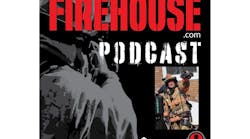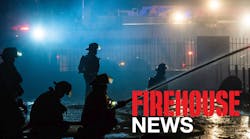When the new chief of Toronto Fire is asked about the direction he wants to take the service, Jim Sales proves he's fluent in the language of Rob Ford.
Sales believes the department should be run "like a business" and that with "tax dollars shrinking" fire services across the country must "find efficiencies" and "do more with less."
Sales, a former fire chief in Edmonton and Markham and now a top manager for the City of Barrie, touted his record in dealing with unions, specifically an agreement negotiated with Markham's firefighters to work overtime at their regular pay rate.
And as far as merging EMS and fire, well, Sales has worked in departments that went that route before and he's interested in seeing if it will work in Toronto.
"I'm not big into policy and governance other than what's needed. I don't build red tape, I try to remove it. I want to get things done," Sales said.
"Trust me. I'm not going there to cause problems. I'm going there to make improvements. I take my job seriously and I'm really looking forward to it. I take it as a challenge and also an opportunity."
In a 45-minute interview from his office in Barrie on Friday afternoon, Sales spoke thoughtfully about his past, what he's learned and where he plans to take Toronto Fire.
The father of two said it's too early to rattle of a list of changes yet. He's had a chance to go through all the public documentation - budget, annual reports, media articles and the KPMG reports. However, until he can speak with the men and women who work in the department, Sales says he won't have a real understanding of the issues at hand.
Generally speaking, three areas jump out at him: staffing, the operations model and the possible merger of fire and EMS.
Sales began his career in northern Alberta as both a firefighter and first responder. When he took a deputy chief job in Edmonton, the city was merging the paramedic and fire units. Two years into the process, the government changed and the initiative was dropped, but some overlap remained.
"It's really about what's the best model for Toronto," he said. "It's really doing an analysis, can it be done and what would the benefit be? Is it to improve service or cost or both? When I had conversations with members of council (during the hiring phase), they're saying we want to improve response times."
But perhaps that could be addressed by rejigging the job description of a Toronto firefighter, Sales said. Maybe they don't need to respond to certain medical calls. Maybe there is a more efficient way to deal with false alarms. And maybe the service needs to look at advocating for legislative change that would ease the pressure on the service.
"Many municipalities ... mandated sprinklers in every building. That changes your response protocols because you've got buildings with higher levels of protection. Perhaps not in the time (to get to a call), but in the number of units we're sending."
This type of reconfiguration could improve response times, without necessarily merging services.
On the staffing issue - Toronto Fire is currently short about 120 front-line firefighters - Sales said employee safety is the priority. In a perfect world, he said, no truck would be taken off the street for budgetary reasons, but this isn't always possible. The next step is to get creative.
When Sales started in Markham about a decade ago, the city was facing a similar budget crunch and fire trucks were being pulled off the road. The city couldn't afford to pay the overtime needed to man them. So Sales asked the union for a compromise. They negotiated a deal where firefighters would staff the trucks for straight time rather the overtime rate.
"It was a short-term measure, but it worked. Optics are important."
The decision to hire from outside, rather than a Toronto employee who has moved through the ranks, is an unusual one, Councillor Giorgio Mammoliti (Ward 7, York West) acknowledged last week.
"I think this administration has very clearly said that we would like partners in this city (such as Toronto Fire) that have the ability to think outside the box and do things a little differently," said Mammoliti.
Sales officially starts as chief on Aug. 20.
Age: "I'm not past my best-before date."
Hometown: Cold Lake, Alta.
Tims or Starbucks? Tim Hortons (medium with milk)
Pasta or Sushi? "Pasta, oh yes." Spaghetti is the poison of choice.
Dog or cat? He has a dog and two rescue cats, but his Belgian sheepdog Carly comes out on top.
Early riser or night owl: Very early riser, usually 5:30 a.m.
Words to live by: "One of my old bosses used to say: 'In God we trust. All others need to bring data.' "
When you're not at work you're: Outside. "Yard work, golf, hockey. I just like being outside. I grew up on a farm."
First job: Working for his uncle, who cleared land. "I was 14 years old and he cleared about 320 acres and my job was to pile up roots and burn them."
Copyright 2012 Toronto Star Newspapers Limited






